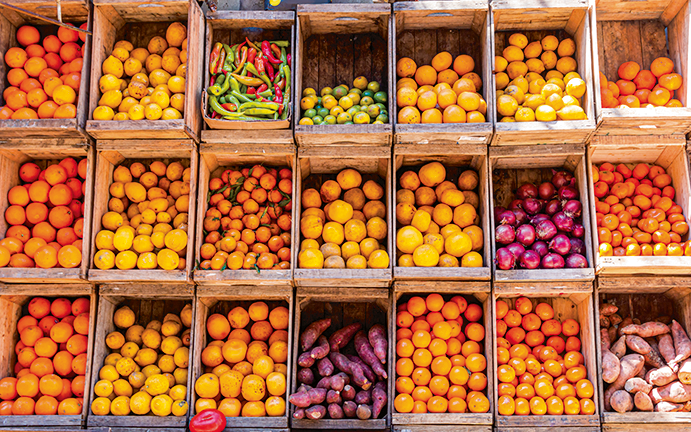Introduction:
In the dynamic world of global trade, sustainability has become more than a buzzword; it is a critical imperative. The global fruit trade, a cornerstone of international commerce, is increasingly recognizing its role in environmental stewardship. This blog explores the significance of promoting sustainability in the global fruit trade, the challenges faced, and the transformative initiatives that pave the way for a greener and more responsible future.
The Global Significance of the Fruit Trade:
1. Economic Impact:
The global fruit trade is a major contributor to the world economy, fostering economic development and providing livelihoods for millions. As one of the most traded commodities, fruits play a pivotal role in global food systems, creating interconnected networks of producers, distributors, and consumers.
2. Nutritional Importance:
Fruits are essential for a balanced and nutritious diet, contributing vital vitamins, minerals, and antioxidants. The global fruit trade ensures a diverse and year-round availability of fruits, addressing nutritional needs and promoting healthier lifestyles.
The Imperative for Sustainability in the Fruit Trade:
1. Environmental Impact:
The environmental impact of the fruit trade is substantial, encompassing factors such as transportation emissions, packaging waste, and agricultural practices. Acknowledging and addressing these impacts is crucial for mitigating climate change, preserving biodiversity, and fostering sustainable ecosystems.
2. Consumer Awareness:
In an era of heightened environmental awareness, consumers are increasingly conscious of the ecological footprint of the products they consume. The global fruit trade, catering to a diverse and discerning consumer base, must align with sustainability principles to meet evolving consumer expectations.
Transformative Initiatives in Promoting Sustainability:
1. Adopting Sustainable Agricultural Practices:
- Organic Farming:
Transitioning to organic farming practices reduces the reliance on synthetic pesticides and fertilizers, promoting soil health and biodiversity. Organic farming in the global fruit trade enhances the nutritional quality of fruits while minimizing environmental impact.
- Agroecology:
Embracing agro-ecological approaches involves designing farming systems that work with nature rather than against it. Integrating ecological principles into agriculture enhances resilience, reduces the need for external inputs, and contributes to sustainable fruit production.
2. Green Transportation and Logistics:
- Efficient Supply Chains:
Optimizing supply chains through technological advancements, such as blockchain for traceability and data analytics for demand forecasting, streamlines transportation routes, reduces waste, and minimizes carbon emissions.
- Alternative Fuels:
Transitioning to alternative and sustainable fuels, such as electric or biofuel-powered vehicles, mitigates the environmental impact of transportation in the global fruit trade. The adoption of cleaner energy sources contributes to a greener and more sustainable logistics network.
3. Eco-Friendly Packaging Solutions:
Biodegradable Materials:
Shifting away from traditional, non-biodegradable packaging materials to biodegradable options, such as plant-based plastics or compostable packaging, significantly reduces the environmental footprint of the global fruit trade.
- Minimalist Packaging Design:
Embracing minimalist packaging designs not only reduces waste but also lowers the carbon footprint associated with production and transportation. Lightweight and eco-friendly packaging options align with sustainability goals.
4. Fair Trade and Social Responsibility:
- Ensuring Fair Labor Practices:
Promoting fair trade practices in the global fruit trade ensures equitable remuneration for farmers and workers. By fostering social responsibility, the industry contributes to the well-being of communities and addresses social and economic inequalities.
- Community Engagement:
Engaging with local communities, especially in developing regions, fosters sustainable development and empowers communities involved in fruit production. This approach ensures that the benefits of the global fruit trade extend beyond economic gains.
Challenges in Promoting Sustainability:
1. Complex Supply Chains:
The intricate and often convoluted supply chains in the global fruit trade pose challenges in implementing sustainable practices. Coordinating efforts across diverse stakeholders, from growers to distributors, requires strategic planning and collaborative initiatives.
2. Consumer Education:
Educating consumers about the importance of sustainability in the global fruit trade remains a challenge. Overcoming misconceptions, fostering awareness about eco-friendly choices, and highlighting the positive impact of sustainable practices are crucial components of a successful sustainability campaign.
3. Regulatory Harmonization:
Divergent regulations across countries and regions present hurdles for the global fruit trade to adopt uniform sustainability standards. Harmonizing regulations and creating a supportive regulatory environment is essential for the widespread adoption of sustainable practices.
The Road Ahead: Fostering a Green Revolution in the Fruit Trade:
1. Industry Collaboration:
Promoting sustainability in the global fruit trade requires a collaborative approach. Industry players, governmental bodies, non-governmental organizations, and consumers must work together to create a shared vision and implement sustainable initiatives.
2. Investment in Research and Development:
Continued investment in research and development is crucial for identifying innovative solutions that enhance sustainability in the global fruit trade. From eco-friendly farming practices to cutting-edge packaging technologies, research-driven advancements drive positive change.
3. Transparent Supply Chains:
Creating transparency in supply chains through technologies like blockchain ensures accountability and traceability. Transparent supply chains empower consumers to make informed choices and hold businesses accountable for their sustainability commitments.
Conclusion: Cultivating a Sustainable Future in the Global Fruit Trade
As the global fruit trade continues to evolve, promoting sustainability is not just a responsibility but an imperative. By embracing transformative.
